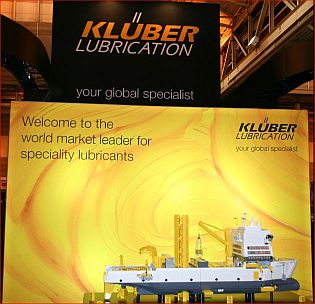“Imagine using a common grease and it’s dripping on the deck of a ship. People slip and fall,” says Ben Bryant, Marketing Manager of Kluber Lubricants. To prevent this from happening in the future, Bryant recommends using their adhesive grease. “It adheres well in these situations,” he says. “You probably wouldn’t use that same grease in a bearing. For that, you would need a grease that can operate correctly with a high-speed bearing.”
Kluber services the marine industry for things like thrusters, stern tubes, jack-up legs, and  general deck grease. All different types of greases to operate on a vessel. Other specialty greases would include bearing grease in the engine room, wire-rope grease, etc.
general deck grease. All different types of greases to operate on a vessel. Other specialty greases would include bearing grease in the engine room, wire-rope grease, etc.
How do they improve safety, you ask? At the Workboat Show in New Orleans, Kluber launched a new grease that comes in an automatic spray applicator. It’s for jack-up legs. “Jack-up legs need a specific kind of grease,” says Bryant. “It must withstand high loads, have good corrosion protection and adhesion, plus work in a spray applicator. This is especially important when you have maintenance vessels that use spuds to lift the vessel out of the water. More so when it’s anchored like a platform.”
A 2010 study by Etkin, estimated that most lubricant oils leaked into our waterways throughout the world come from commercial shipping vessels. This study shows stern tube leakage is between 4.6 to 28.6 million liters. Operational discharges and leaks make up for 32.3 million liters of oil introduced to marine waters. Together they are equivalent to one and a half Exxon Valdez-sized spills.
In 2013, the Clean Water Act and the EPA announced all lubricants entering the waterways should be
- Biodegradable
- Non-toxic and,
- Non-bio-cumulating.
Since then Kluber has met that challenge. They now have one of the largest portfolios of Environmentally Acceptable Lubricants (EAL).
Kluber lubricants help marine operators keep both their vessels and the environment safe; for marine life. Five ways are:
- increasing operational objectives
- increasing financial outcome of your operation
- extending the life of your equipment
- extending time between service intervals and,
- Improving safety.
They do this by listening to their customers and developing new lubricants for their use.
Based in Germany, Kluber has ten plus production and sales facilities; globally. And an inventory of over 2,000 lubricants.
To reach Kluber about your specific needs is easy. Contact them on their website at http://kluber.com and they’ll assign you a local sales engineer to get the conversation started.
For more information about the 2013 Vessel General Permit (VGP) for discharges download this pdf:
Or, for the Environmentally Acceptable Lubricants download this pdf:
VGP_Environmentally_Acceptable_Lubricants.pdf
You must be logged in to post a comment.